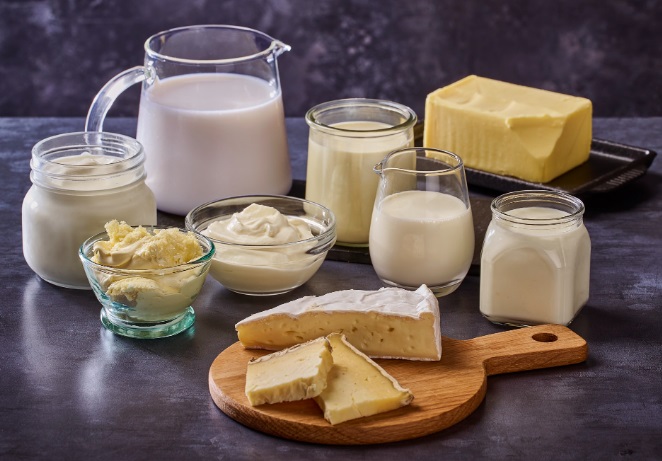Nikhil Prasad Fact checked by:Thailand Medical News Team Jan 18, 2025 3 months, 3 weeks, 1 day, 3 hours, 32 minutes ago
Health News: Recent research has brought new insights into the connection between dairy product consumption and the risk of certain digestive cancers. A team of researchers from institutions including the Instituto de Investigación Sanitaria y Biomédica de Alicante, Universidad Miguel Hernández, and CIBER Epidemiología y Salud Pública in Spain conducted a multi-case control study exploring how different types of dairy products affect the likelihood of developing esophageal, stomach, and pancreatic cancers. This
Health News report delves into the findings of the PANESOES study, which highlights the varying impacts of fermented dairy, sugary dairy desserts, and milk on these cancers.
 Dairy Consumption and the Risk of Digestive Cancers
The Scope of the Study
Dairy Consumption and the Risk of Digestive Cancers
The Scope of the Study
The PANESOES study analyzed data from 1,229 participants, including 774 individuals diagnosed with one of the three types of digestive cancers - esophageal, stomach, or pancreatic - and 455 healthy controls. Participants were matched by age, gender, and region, and dietary habits were assessed using a validated food frequency questionnaire. Dairy consumption was categorized into total intake and subgroups: fermented dairy, sugary dairy desserts, and milk. Researchers used multinomial logistic regression to evaluate the risk of cancer while accounting for variables such as smoking, alcohol consumption, and dietary habits.
Key Findings on Dairy Consumption
The study uncovered intriguing relationships between dairy consumption and cancer risks:
-Fermented Dairy Products: Foods like yogurt, cheese, and cottage cheese showed a protective effect against esophageal and stomach cancers. Individuals consuming higher amounts of fermented dairy experienced a 45% reduced risk of esophageal cancer and a 32% lower risk of stomach cancer compared to those with the lowest intake.
-Sugary Dairy Desserts: In stark contrast, the consumption of sugary dairy desserts such as ice cream, custards, and puddings was associated with a significantly increased risk of stomach cancer, particularly for intestinal adenocarcinoma. Those consuming the highest amounts of sugary dairy desserts had an 85% higher risk of stomach cancer than those with the lowest intake.
-Milk Consumption: Surprisingly, milk consumption showed no significant association with the risk of esophageal, stomach, or pancreatic cancers.
Biological Mechanisms Behind the Findings
The protective effect of fermented dairy products is attributed to their rich content of probiotics, calcium, and vitamin D. Probiotics enhance gut health by modulating the microbiota and reducing inflammation, both of which are critical in preventing gastrointestinal cancers. Calcium binds harmful bile acids and fatty acids in the gut, reducing their cytotoxic effects on the mucosal lining. Vitamin D plays a role in regulating cell growth and apoptosis, which can inhibit cancer development
.
On the other hand, sugary dairy desserts, often ultra-processed, contain high levels of added sugars and unhealthy fats. These components may disrupt gut microbiota, lead to chronic inflammation, and promote obesity - all factors that elevate the risk of stomach cancer. Additionally, ultra-processed foods may contain additives and chemical residues that can harm the gastric mucosa.
Broader Implications
While the study highlights clear patterns, it also raises questions about regional and cultural dietary habits. Dairy products consumed in Spain may differ in composition and processing methods from those in other parts of the world, potentially influencing the results. The lack of significant findings for milk aligns with some studies but contradicts others, suggesting a need for further research to clarify these relationships.
Conclusions
This study emphasizes the potential health benefits of fermented dairy products and the risks associated with sugary dairy desserts. Encouraging the consumption of nutrient-rich fermented dairy could be a strategy to reduce the incidence of esophageal and stomach cancers. At the same time, limiting sugary dairy desserts may be critical in curbing stomach cancer risks. Future research should aim to replicate these findings in larger and more diverse populations, exploring the underlying mechanisms in greater detail.
The study findings were published in the peer-reviewed journal: Cancers.
https://www.mdpi.com/2072-6694/16/24/4151
For the latest
Health News, keep on logging to Thailand
Medical News.
Read Also:
https://www.thailandmedical.news/news/u-s-study-reveals-that-men-with-higher-intake-of-dairy-foods-especially-milk,-but-not-nondairy-calcium,-had-a-higher-risk-of-prostate-cancer
https://www.thailandmedical.news/news/study-links-dairy-products-with-higher-risk-of-prostate-cancer
https://www.thailandmedical.news/news/infected-cows-can-produce-milk-that-has-a-changed-composition-which-can-affect-human-health
